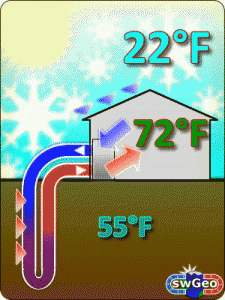 When it comes to heating and air conditioning options, geothermal heat pumps are possibly the best option out there. If that’s true, then why aren’t they household names? That’s most likely because they’re expensive upfront and can only be installed with enough property to work with. Other than that, geothermal heat pumps truly boast some great qualities, such as:
When it comes to heating and air conditioning options, geothermal heat pumps are possibly the best option out there. If that’s true, then why aren’t they household names? That’s most likely because they’re expensive upfront and can only be installed with enough property to work with. Other than that, geothermal heat pumps truly boast some great qualities, such as:
Lifespan
When it comes to geothermal heat pumps, there’s one consideration that really stands out against other types of HVAC systems: Do you plan to stay in your home for several decades to come?
The underground loops used by geothermal heat pumps are capable of lasting for over 50 years, making them a great investment. Of course, you’re not going to be able to dig up your geothermal heat pump and take it with you. Unless you’re trying to increase the value of your home before selling it, you may want to opt for a standard central AC or ductless mini split system if you don’t plan to play the long game.
Efficiency
Heat pumps work simply by transferring warmth. Your standard heat pumps are called air-source heat pumps since they transfer warmth from the air. These heat pumps do their jobs very well even in the winter, but temperatures that are consistently close to 0 will start to give air-source heat pumps a difficult time. It can actually become inefficient to run air-source heat pumps in these conditions.
In these cases, a ground-source heat pump—like a geothermal heat pump—can solve the problem. Temperatures below the ground stay mostly the same all year round, thus making them run under the same conditions all year round. This also helps with the lifespan, since the year-round efficiency prevents the heat pump from having to exert itself.
Duct Systems
Some manufacturers do have ductless options, but for the most part, you’ll find that geothermal heat pumps in Fort Wayne, IN are paired with duct systems. Ducts bring equal pros and cons.
The pros are that ducts are an affordable way to heat or cool your entire home. Combined with a zone control system, your duct system can give you the ability to control each room individually. Ducts also play nicely with whole-house indoor air quality options like air purifiers, filters, and humidifiers/dehumidifiers.
A ductless variation would require that you install a separate air handler for each room that you want to have cooled or heated. Although it can be efficient, this setup can be very costly up-front. For a geothermal heat pump, we think it makes more sense to go with the ducts; a system that lasts this long will be better used when it’s for heating and cooling the entire home.
As for the cons, it mostly has to do with flaws in the duct systems. A brand new duct system will last you for years and not cause many issues, but they will eventually need to be resealed and cleaned. Duct systems that go for a long time without maintenance can develop leaks, and that can cost you plenty in wasted energy costs.
